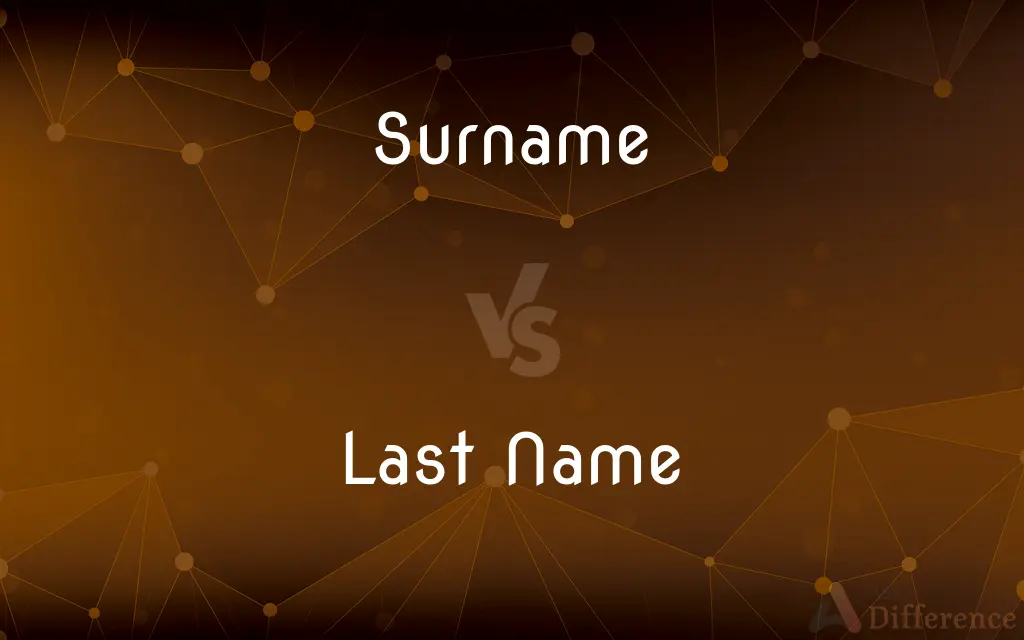Surname vs. Last Name — What's the Difference?
By Tayyaba Rehman — Published on November 8, 2023
Surname and Last Name are synonymous, both referring to the family name passed down through generations, distinguishing individuals within a family or group.

Difference Between Surname and Last Name
Table of Contents
ADVERTISEMENT
Key Differences
A surname historically serves as a way to denote an individual's family lineage. It has cultural, social, and familial significance, indicating a person's ancestral background. On the other hand, the term "last name" is a straightforward descriptor, indicating the name's position as the final entry when writing out a person's full name.
While "surname" has roots in historical contexts and may carry ancestral implications, "last name" is a more modern, functional term. The last name specifies the sequence in which names appear, especially in cultures where the family name follows the given name. Both terms, however, serve the purpose of distinguishing individuals within a broader societal context.
The word "surname" may evoke a sense of tradition and heritage. Many surnames can trace back their origins to occupations, geographical regions, or family characteristics. In contrast, "last name" is a neutral term, not laden with any such historical or cultural connotations but merely pointing out the order of the name.
In certain cultures and traditions, the importance of a surname is paramount, as it carries the weight of ancestry and familial honor. The term "last name," while universally understood, may not carry the same weight of tradition but is universally recognized and used in formal and official documentation.
Lastly, while both terms can be used interchangeably in many contexts, understanding their nuances can give insights into cultural and historical aspects of naming conventions. The surname connects people to their past, while the last name indicates its position in a sequence.
ADVERTISEMENT
Comparison Chart
Historical Context
Tied to family lineage and ancestry.
A neutral descriptor of name position.
Cultural Weight
Often holds cultural and traditional importance.
Generally functional, without cultural implications.
Usage
Common in discussing heritage or lineage.
Common in formal, administrative, or official contexts.
Implication
May indicate origins tied to occupation, regions, or characteristics.
Simply implies the order of names.
Connotation
More traditional and historic.
Neutral and modern.
Compare with Definitions
Surname
A name signifying familial heritage.
Their surname indicates ties to Scandinavian ancestors.
Last Name
The final part of a person's full name.
Fill in your last name in the provided box.
Surname
The name representing family lineage.
Johnson is their surname, denoting a lineage of craftsmen.
Last Name
The family name of an individual.
Her last name is Stevens, while her first name is Lucy.
Surname
The identifier shared among family members.
Each member of the family carries the surname Brown.
Last Name
The name signifying family heritage.
My first name is Jack; my last name is Miller.
Surname
A name shared in common to identify the members of a family, as distinguished from each member's given name. Also called family name, last name.
Last Name
A name shared among family members.
We all have the last name Reyes.
Surname
A nickname or epithet added to a person's name.
Last Name
The name inherited from ancestors.
Write your first name followed by your last name.
Surname
To give a surname to.
Surname
(obsolete) An additional name, particularly those derived from a birthplace, quality, or achievement; an epithet.
Surname
(obsolete) An additional name given to a person, place, or thing; a byname or nickname.
Surname
The name a person shares with other members of that person's family, distinguished from that person's given name or names; a family name.
James is my first name, and Smith is my surname.
Surname
(Classical studies) The cognomen of Roman names.
Surname
A clan.
Surname
(transitive) To give a surname to.
Surname
(transitive) To call by a surname.
Surname
A name or appellation which is added to, or over and above, the baptismal or Christian name, and becomes a family name.
Surname
An appellation added to the original name; an agnomen.
Surname
To name or call by an appellation added to the original name; to give a surname to.
Another shall subscribe with his hand unto the Lord, and surname himself by the name of Israel.
And Simon he surnamed Peter.
Surname
The name used to identify the members of a family (as distinguished from each member's given name)
Surname
A hereditary name common to members of a family.
The surname Smith might originate from blacksmithing ancestors.
Surname
The name that follows given names.
In Jane Doe, Doe is the surname.
Common Curiosities
What is a Surname?
A surname denotes family lineage and is commonly shared among family members.
Is Surname tied to history and culture?
Yes, surnames often trace back to occupations, regions, or characteristics of ancestors.
Can I use Surname and Last Name interchangeably?
In many contexts, yes, though "surname" may evoke more traditional connotations.
When do people typically use "Last Name"?
It's frequently used in formal, administrative, or official contexts.
Why do surnames exist?
They historically denote family lineage, helping distinguish individuals within larger groups.
How does Last Name differ from Surname?
They are synonymous; however, "surname" often holds historical connotations, while "last name" indicates the name's position.
Is "Surname" used more in British English?
Both "surname" and "last name" are understood, but "surname" is more common in British English.
Is the term "Last Name" universally understood?
Yes, it's a widely recognized term indicating the family name.
Can surnames indicate geographical origins?
Absolutely, many surnames relate to geographical regions from where ancestors hailed.
Can surnames change over generations?
Yes, surnames can change due to marriage, adoption, or personal choice.
Can a surname have multiple words?
Yes, some surnames are hyphenated or consist of multiple words.
Do all cultures place the surname last?
No, in some cultures, the family name (surname) comes before the given name.
Does everyone in a family always have the same Last Name?
While common, not always. Some may hyphenate, and some might choose different last names due to personal or cultural reasons.
Do any cultures not use surnames?
Most cultures use surnames, but the emphasis and arrangement can vary.
Is it common to use both "Surname" and "Last Name" on forms?
While either can appear on forms, "Last Name" is more commonly seen on official and administrative documents.
Share Your Discovery

Previous Comparison
Damped Oscillation vs. Forced Oscillation
Next Comparison
Action Research vs. Case StudyAuthor Spotlight
Written by
Tayyaba RehmanTayyaba Rehman is a distinguished writer, currently serving as a primary contributor to askdifference.com. As a researcher in semantics and etymology, Tayyaba's passion for the complexity of languages and their distinctions has found a perfect home on the platform. Tayyaba delves into the intricacies of language, distinguishing between commonly confused words and phrases, thereby providing clarity for readers worldwide.












































